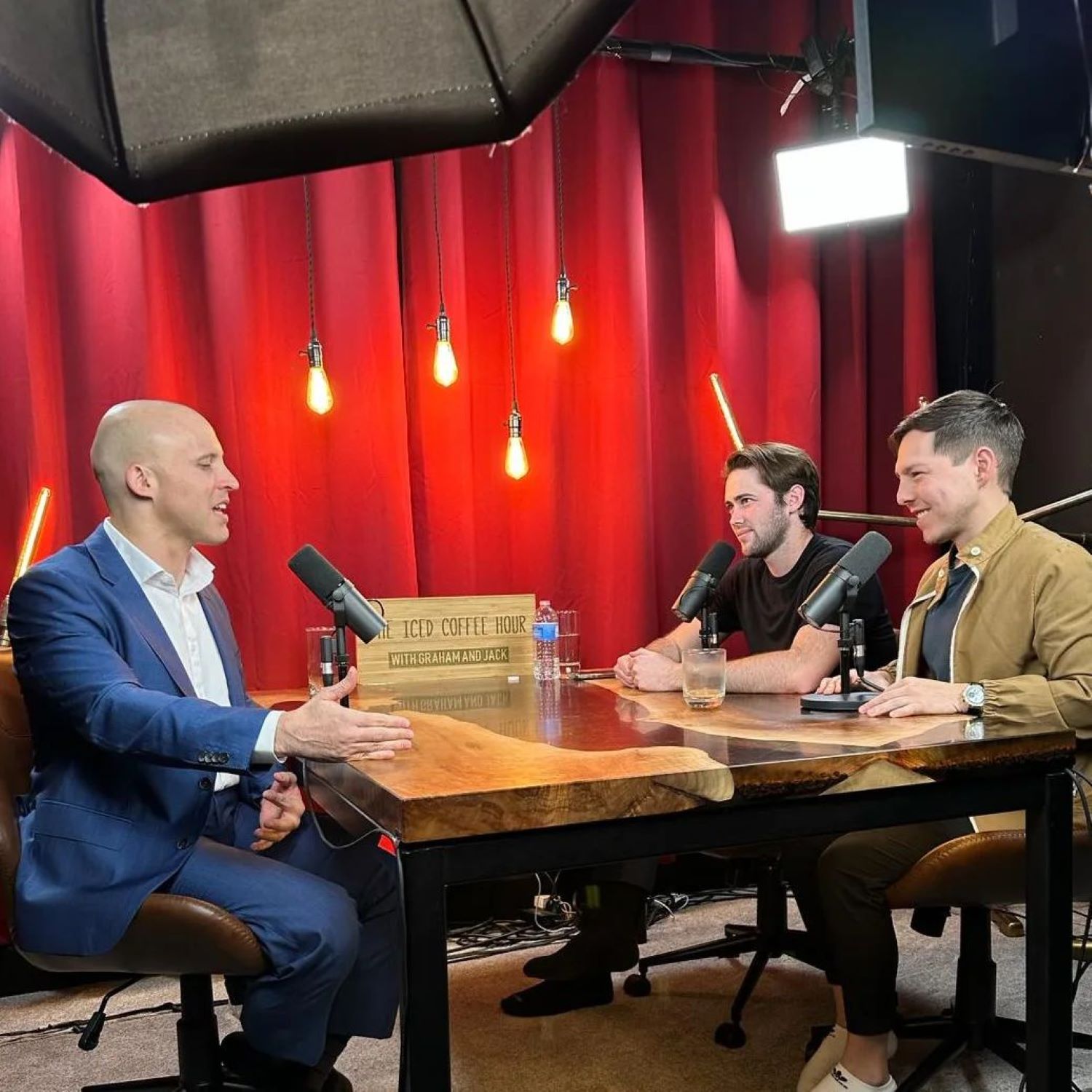How David Packouz Transformed Himself Post-$300M Contract Collapse
In the riveting narrative of “War Dogs,” a film inspired by true events, audiences are thrust into the high-stakes world of government contracting, where ambition, intrigue, and ethical dilemmas collide.
At the heart of this gripping tale lies the character of David Packouz, a real-life entrepreneur whose journey from humble beginnings to the forefront of the government contracting industry is as compelling as it is transformative.
As a young entrepreneur, he ventured into the field of government contracting, driven by ambition and a thirst for opportunity. Along the way, he encountered challenges that tested his resolve, from navigating the intricacies of procurement procedures to confronting ethical dilemmas that threatened to compromise his principles.
David Packouz: Venture into the World of Government Contracting
Back when David Packouz was in college, he was already knee-deep in the world of entrepreneurship. With a keen eye for opportunity, he dabbled in various online ventures, from peddling SD cards on eBay to sourcing and selling bed sheets and linens imported from Pakistan to nursing homes and hospitals.
Despite the hustle and the modest success, he found in these endeavors, a chance encounter with an old friend changed the game.
Efraim’s Guiding Hand: Leading David Packouz into the Government Contracting Arena
Hearing about David’s endeavors in logistics and overseas sourcing, Efraim recognized the transferable skills that could be harnessed in government contracts.
Efraim’s proposition was underscored by tangible proof of his prowess in the field. At just 18 years old, he had amassed a staggering $1.8 million in cash within a year of venturing into government contracting.
“I realized this guy knows something I don’t and I could learn a lot, so I said ‘I’m in, let’s do this’, and he taught me how Government Contracting worked, and his specialty was more in the weapons and ammunition, he was a gun nut, so he was mostly focusing on that stuff and he asked me to focus on other things so we could expand the business,” said David.

Joining forces with Efraim towards the end of 2005 and the beginning of 2006 was a strategic move for David. By this time, Efraim had already established himself as a force to be reckoned with in the world of government contracting.
With a string of successful contracts under his belt, particularly in Iraq, Efraim’s track record positioned them for even greater opportunities.
The Mystery Behind the Failed $300 Million Ammunition Contract
Securing the Beretta deal was a significant triumph for David and Efraim. However, their excitement was short-lived as they encountered unforeseen obstacles that ultimately led to the deal’s collapse.
Central to the endeavor was the decision by the United States Army to supply Warsaw Pact-style munitions to the Afghan forces, recognizing their familiarity with weapons such as the AK-47 and the cost-effectiveness of these munitions compared to NATO-standard ammunition.
However, navigating the procurement process for Warsaw Pact munitions proved to be a Herculean task. With the Russians initially poised as the sole supplier, the geopolitical landscape shifted dramatically when they were blacklisted due to their supply of nuclear technology to Iran.
This abrupt turn of events forced the Army to seek alternative procurement channels, leading to the involvement of middlemen like David and Efraim.
Drawing on their extensive experience and past performance in supplying similar items to Iraq, David and Efraim went on a rigorous bidding process. Despite initial doubts about their chances of success, they meticulously crafted a competitive bid, leveraging connections and negotiating deals with suppliers across Eastern Europe.
One notable coup in their procurement strategy was the acquisition of AK-47 ammunition through a connection in Albania facilitated by a Swiss arms dealer. This deal, born out of Albania’s need to dispose of its Soviet-era munitions to comply with NATO requirements, offered David and Efraim a significant cost advantage.
However, what they didn’t anticipate was the contractual stipulation prohibiting the use of Chinese ammunition, which inadvertently encompassed the Albanian stockpile obtained from China in the 1970s.
“In our contract very specifically said no Chinese ammunition either directly or indirectly can be supplied under this contract,” said David.
The revelation of the Chinese origin of the ammunition presented David and Efraim with a daunting dilemma. Aware that disclosing this information to the Army could jeopardize their $300 million contract, they grappled with the consequences of their actions. While seeking a waiver from the Army was an option, they feared that it could lead to the contract being revoked and put out for open bid, potentially resulting in their competitors gaining an unfair advantage.

Faced with the prospect of losing the lucrative contract, David and Efraim made the fateful decision to conceal the origin of the ammunition by repackaging it. Hiring an Albanian intermediary to repackage the Chinese ammunition into nondescript boxes seemed like a solution to their predicament, allowing them to continue fulfilling their contract without raising suspicion.
Initially, their plan appeared to be successful as they seamlessly delivered large quantities of ammunition to the Army, garnering praise for the quality of their products. The operation ran smoothly, with aircraft loads of ammunition dispatched weekly, seemingly without a hitch.
However, their success was short-lived as internal tensions between David and his partner escalated. When David refused to accept a fraction of what he was owed, citing their contractual agreement, he decided to part ways with his partner. Little did he know that this decision would mark the beginning of the end for their operation.
“My former partner decided that he didn’t want to pay me the millions of dollars he owed me and so he said he pretty much offered to give me like a very small fraction of what he owed me and I told him I’m not going to take that because we have an agreement and so I quit,” David stated.
A couple of months after David’s departure, federal authorities raided his former partner’s office, unraveling the intricate web of deception and fraud that had sustained their operation.
David and Efraim: The Fallout of Deception and Betrayal

After the New York Times published allegations of delivering low-quality, defective ammunition, David and Efraim found themselves embroiled in a political scandal. The sensationalized reports painted a damning picture, portraying their ammunition delivery as a danger to allies and sparking congressional hearings and public outrage.
The media frenzy fueled a narrative of incompetence and endangerment, with David and Efraim’s operation at the center of scrutiny. Despite the fact that the defective ammunition in question was a small portion of their overall delivery, the portrayal in the media led to widespread condemnation and questioning of their competency to handle such a substantial contract.
Amidst the chaos, the Army publicly announced the cancellation of their contract, further exacerbating the situation. Subsequently, the Justice Department levied serious charges against David, Efraim, and their associates, accusing them of multiple counts of fraud related to the misrepresented origin of the ammunition.
David’s plea deal resulted in seven months of house arrest, while Efraim received a four-year prison sentence. Despite the significant consequences, Efraim’s behavior remained erratic and defiant. Even after being convicted, he continued to engage in illegal activities, leading to further legal trouble and additional prison time.
“I was extremely grateful that I got only seven months of house arrest which wasn’t so bad,” David said.
David’s Personal Transformation: Redemption Amidst Turmoil
Following his legal ordeal, David found solace and inspiration in his passion for music. Despite the constraints of house arrest, he immersed himself in guitar playing, often inviting musician friends over to jam. Yet, the absence of a drummer posed a challenge until a spark of ingenuity ignited.
The Beat Buddy: The World’s First Guitar Pedal Drum Machine
Yearning for a more dynamic musical experience, David conceived the idea of a guitar pedal drum machine – a device that would allow him to control drum beats with his foot while playing guitar.
Surprisingly, he discovered that such a product didn’t exist in the market. Undeterred, he embarked on a three-year journey into uncharted territory, venturing into product development for the first time.

In 2014, David’s perseverance bore fruit with the launch of the Beat Buddy, the world’s first guitar pedal drum machine. Its success propelled him into the world of entrepreneurship, leading to the founding of Singular Sound. Over the years, Singular Sound has expanded its product line, catering to musicians’ needs with innovative solutions.
“We’re actually working now on Beat Buddy 2.0, which is the follow-up product that’s going very well and that was my career of developing products,” David said.
Beyond music, David’s entrepreneurial spirit continued to thrive. Collaborating with his brother, they devised Instafloss—a revolutionary dental hygiene product designed to streamline flossing with water jets.
“I’m so much happier, being able to work in a business where I get to be creative and improve people’s lives,” he said.
The War Dogs Academy: Training for Government Contract Success
Since the release of the movie “War Dogs,” David Packouz has been inundated with requests for guidance on navigating the world of government contracting. Recognizing the complexity of the process and the need for accessible resources, David went on a mission to empower aspiring entrepreneurs in this field.
Enter Logan and James, two individuals inspired by “War Dogs” who took it upon themselves to master government contracting. Their journey from self-taught novices to successful business owners in the lucrative world of laundry services proved that with determination and grit, anything is possible.
With David’s expertise and Logan and James’s real-world experience, the War Dogs Academy was born. This online platform aims to demystify government contracting, providing comprehensive courses and resources for aspiring entrepreneurs.
The Academy’s focus is on accessibility and practicality, ensuring that individuals can navigate the complexities of the industry with confidence.
Moreover, the War Dogs Academy offers a community forum where budding entrepreneurs can connect, collaborate, and forge partnerships.
Investors Rally Behind War Dogs Academy’s Government Contract Ventures with Funding
Perhaps most excitingly, the War Dogs Academy has attracted investors eager to support and finance promising ventures in government contracting.
“I think the most exciting thing about it is that we have investors who are eager to invest and finance government contracts,” David said.
At the core of this initiative is the recognition of a common hurdle faced by many newcomers to the industry: the need for upfront capital to fulfill contract obligations. As David, co-founder of War Dogs Academy, explains, this financial barrier can hinder the progress of promising ventures.
To address this issue, the Academy has forged partnerships with a network of investors who are eager to finance government contracts. This collaboration opens up new possibilities for entrepreneurs, providing them with the financial backing needed to kickstart their projects.
The key to this approach lies in its mutual benefits. For investors, government contracts represent a relatively safe investment opportunity. As long as contractors adhere to the terms of their agreements and maintain reliable supply chains, the likelihood of returns is high. Furthermore, with the backing of War Dogs Academy, investors can access a curated selection of contracts, minimizing risk and maximizing potential gains.
Meanwhile, for students of the Academy, this funding mechanism offers a lifeline. By alleviating the financial burden of upfront costs, entrepreneurs can focus on what they do best: delivering quality goods and services to government agencies.
Additionally, the competitive bidding system ensures that students receive optimal financing terms, allowing them to retain more of their profits and fueling further growth and innovation.
“What we’re planning on doing is setting up a bidding system for contracts that have been won by our students and investors can bid what they are willing to fund the contract for, so that way our students get the best possible financing for their contracts and get to keep as much of the profit as possible, and investors get opportunities to invest in safe contracts at competitive rates,” David shared.
Insights from David: Personal Wisdom for Success
From his own learned experiences, David Packouz draws invaluable insights, offering the wealth of his entrepreneurial journey.
Choosing Your Professional Allies Wisely: Embracing the Unexpected
Divid warns against the dangers of working with individuals whose values diverge from our own, as it can gradually shape our attitudes and behaviors.
He underscores the challenge of extricating oneself from toxic environments, particularly when success and financial gains seem imminent. He acknowledges the allure of rationalizing one’s presence in such situations, despite knowing deep down that they are morally compromising.
“I would say the biggest lesson that I took away from there is to be very careful about who you work with. If you’re working with someone that you don’t enjoy working with, or that you have problems working with, or you don’t agree with, you kind of get swept along and you kind of become more like that person,” said David.
His acknowledgment of the difficulty in finding an exit point resonates with many who have found themselves trapped in similar circumstances. The allure of success can cloud judgment and delay action, perpetuating a cycle of compromise and moral erosion.
Securing Government Contracts: Open Doors for Everyone
Besides, David Packouz’s statement highlights the belief that winning government contracts, like succeeding in any business venture, is attainable for anyone with dedication and perseverance.
“I think anyone can do it they just need to have the commitment in order to learn the nitty-gritty of the details and to follow through with all the difficult work,” David stated.
Packouz’s perspective underscores the universal nature of business challenges while also highlighting the significance of perseverance as a fundamental trait for success. Whether it’s understanding complex regulations, competing in a crowded marketplace, or overcoming financial obstacles, perseverance serves as a guiding force for entrepreneurs.

It allows them to weather setbacks, adapt to changing circumstances, and ultimately push through to achieve their goals.
“Every business has its own unique set of challenges, developing a product from the ground up was very difficult and had a lot of set facts,” he said.
The Path to Success: Never Give Up
“Who don’t give up are the ones who succeed and that is the most important thing,” said David.
His emphasis on dispelling the myth of instant gratification echoes the sentiments of many who have traversed similar paths. Success, he asserts, is not a get-rich-quick scheme but rather a venture that demands dedication, hard work, and an investment of time.
“You can make as much money as you want, you can make millions, but it’s not quick, it’s not easy, if you are willing to put in a lot of hard work and you’re willing to put in time then you can make millions, but it does take the hard work and it does take the time,” said David.
“I think that accepting the fact that’s required is a huge component of anyone’s success because I think if you don’t realize that, and you think that it’s going to be easy, then you’re going to give up,” he added.









